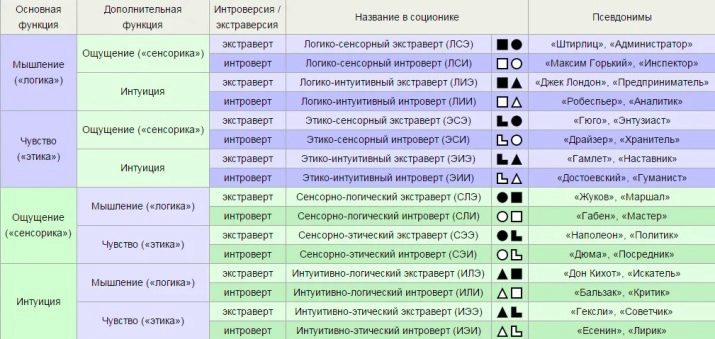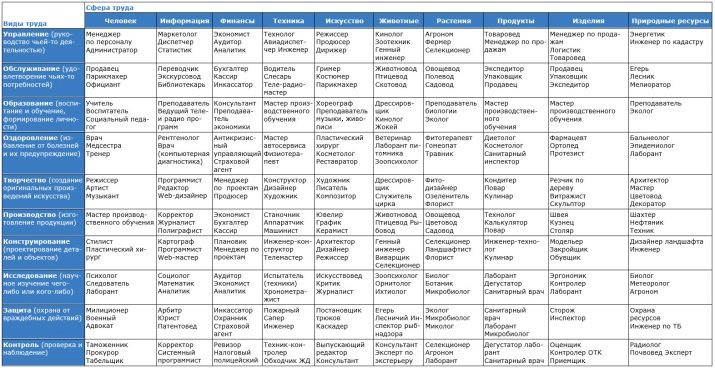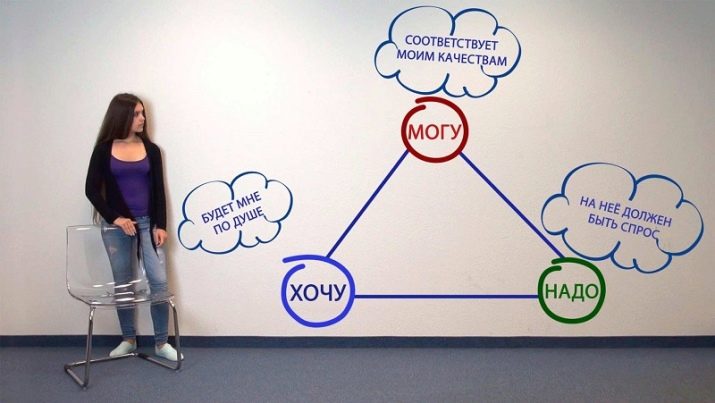How to choose a profession if you don't know what you want?

When the school years are in the past and you have a certificate of complete secondary education in your hands, the question arises of what to do next. I don’t want to choose a profession based on the suggestions of friends or parents, but I don’t have any special preferences of my own. It seems that the situation is hopeless, but in fact this happens very often, so special methods have been developed for finding a suitable specialty.

Features of motivation
To find a profession that suits your interests, you first need to find your motivation. If you have a goal, then the work will only bring positive emotions, and you will not wait every day for the end of the working time. One of the biggest incentives is the level of wages, because living in abundance is always very attractive. Money is undoubtedly very important when looking for a craft, but by itself it cannot satisfy all the dreams, needs and aspirations of a person.
To make it easier for you to understand the relationship between needs and motivation, you need to understand more about the concept of "need". American psychologist Abraham Maslow has made a pyramid that consistently reveals the needs of a person that motivate people to work. Let's consider each level of the pyramid in more detail:
- physiological needs are the base layer, it is responsible for survival;
- the need for security - the need for protection, stability and health;
- the need to communicate with people from a certain social stratum;
- desire to be recognized - expressed in the desire to achieve success and gain approval;
- the need for self-expression - the desire to unleash your potential.

Solving various problems
The most important and primary step in the search for a specialty is a deliberate correct choice - you need to decide what you want to achieve professionalism. The final choice of a profession is influenced by two main factors: the first is the level of wages and the demand for a specialty, and the second is personal hobbies and inclinations.
Most often, problems arise when it is necessary to find out what a graduate has and what kind of work is close to them. Let's consider some of the most common problems that arise during career counseling.
"I do not want anything"
The young applicant does not like anything - not a single craft is of interest to him. When the search has reached a dead end, act on several points at once.
- Explore specialties. Yesterday's graduate has never worked, not a single occupation is unfamiliar to him. It is difficult to make a choice when you do not know what to choose from and by what criteria to compare. Try master classes, talk to professionals, take industrial tours or special events to get to know your specialties.
- Talk to a career counselor. In adolescence, it can be difficult to find out your inclinations, but it is safe to say that there are no people without interests and hobbies. A consultant will help you identify your aptitudes and tell you in which craft they can be applied.
- Pay attention to your hobbies. Sometimes it happens that a child's hobby can become a lucrative profession, although at first glance it does not seem so.
If a person is actually seriously interested in something, for example, computer games, football or drawing, this can become his job, you just need to find a suitable specialty.

"I like what is difficult to make money on"
This situation develops when a graduate has a serious hobby, but he is not yet getting decent earnings. Dreams need to come true, so be sure to try to further your craft up the career ladder, but also look for a profession closely related to your hobby at the same time. For example, if you like drawing pictures, but selling them is rather long and difficult, try yourself in advertising - this will ensure your life and allow you to continue doing what you love.
Another tricky craft is acting, which is very difficult to make money on early in your career. You can also study as a lawyer in the field of culture, while continuing to play in theatrical scenes or act in extras. Such a base will open up the opportunity to independently support your life, and if you become a professional actor, knowledge of the laws will only become a solid foundation for your career.
"My future profession has not yet been invented"
You don't need to be upset if such a thought appears in your head. When you clearly understand your inclinations and know for sure that your craft will be in demand, feel free to open a new specialty. You have a chance to establish your own cell in the market, to become a pioneer and leader in your business.
No one understood Ralph Lauren when he began to introduce unusual styles of women and men into fashion. Henry Ford designed cars when no one suspected that after a few decades the entire planet would be filled with them.
And just five years ago there was no career consultant profession.

What tests can help?
The choice of a profession should always be taken seriously, an important search factor is the study of your inner world. Special tests will help you explore your inclinations and understand what occupation they are suitable for. After completing them, career guidance will no longer seem like something difficult and distant, and you can easily find your calling.Let's take a closer look at each test.
Socionics
This research is best done first - it reveals your personality type. After passing the socionics test, you will understand the main direction of the search for a specialty - humanitarian or technical. In addition, testing will tell about your personality - whether you are introvert or extrovert, this factor is also very important in finding a suitable job.
Introverts are better off working in a quiet, relaxed environment and interacting with people one-on-one. Working in front of the audience will be difficult and depressing for this type of personality. For extroverts, the opposite is true - they need constant communication and many tasks, otherwise they do not see the point in work. The socionics test will determine your personality type, which will significantly narrow your search for a suitable profession. Your personality traits will always be with you, so build on them first.

Holland Questionnaire
A very interesting and unusual vocational guidance test that gained popularity in the middle of the last century. The questionnaire consists of a table of 240 questions, which can be answered "yes" or "no". The test will determine which craft suits you in character and aspirations, and will also show which positions are better not even considered. The Holland questionnaire distinguishes between six personality types and selects several suitable professions for each.
Let's consider each type in more detail.
- Realist. Such people perform specific tasks calmly and methodically, react quickly to different situations. Suitable professions for a realist: driver, mechanic, electrician, sailor and all other professions that require attention and quick reaction.
- Systematic person. Representatives of this type will do an excellent job with mathematical calculations and compilation of tables. Such people are characterized by increased attention to detail, perseverance and complaisance. It is better for a systems person to choose the following vacancies: accountant, analyst, marketer, economist or programmer.
- Entrepreneur. Individuals in this category are energetic and dominant, very selective in their decisions, but rather impulsive. The vocation of entrepreneurs is the implementation of strategic tasks and the solution of intellectual problems. Suitable profession: Director, businessman, administrator and other management positions.
- Researcher. Such people are freedom-loving and rational, they love to explore the world, think outside the box and often innovate. The vocation of researchers is scientific professions with a bias in physics, astronomy or mathematics.
- Social personality. Such people are unambiguously with humanitarian inclinations - friendly, tolerant and always ready to help. Volunteer activities, work as a teacher, teacher or doctor are suitable for social people.
- Artist. Creative and emotional people who strive for self-expression. Such people are suited to creative craft such as directing, music or art, dance, design and architecture.

Klimov's method
The test will help solve the problem of choosing a profession, directing in the right direction by determining the type of character. This technique contains several categories:
- man-nature is a type of people who are inclined to protect the environment, they are suitable for the craft of a gardener, zoologist, veterinarian or landscape designer;
- man-technician - a person capable of creating mechanisms and parts, repairing machines;
- person-sign system - a category of individuals with a mathematical mindset, they can work as a programmer, editor, accountant or notary;
- a person-artistic image - creative and creative personalities, there are a lot of specialties in this direction, for example, an artist, writer, musician, jeweler, restorer or actor;
- person-person is a social personality type, inclined to communicate, such people can become excellent professionals in medicine, psychology, journalism and parenting.
Career choice matrix
This is a fairly simple way to choose a profession. The matrix consists of a table in which you first select what you would like to work with, and then the specialty profile. At the intersection of two points, you will find a list of professions that match your interests.
It is very easy to pass the test, it will take very little time and will help you choose your future profession.

Selection rules
To successfully choose a craft, take career guidance tests, this will help you decide what to do if you don't like anything. The techniques will help you find an interesting profession if you don't know what you want. If you are not attracted to the proposed job, you do not need to overpower yourself and do what you don’t like. Analyze your inner world and find an activity that matches your hobbies.
Summing up, we note several important aspects:
- determining what you prefer - privacy or company;
- search for a specialty that can reveal and realize your talents;
- location of work relative to home - think about whether you are ready to travel by transport or it is better to look for something to do just a stone's throw from your home;
- the size of the salary - you should not limit yourself in finding a high-paying job, you should have enough funds to live independently.
In addition, always consider your interests, relying more on the past, because most often new hobbies are short-lived and fleeting. If you have been fond of mechanics since childhood, repairing damaged and broken things, but have recently taken a great interest in cooking, it is better to give preference to the old hobby.
To be a professional in your field, you need to choose a specialty that really suits you.









